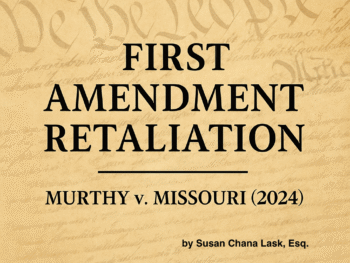(Newark, New Jersey)
March 28, 2008
Traffic stop leads to jail, strip searches Man’s class-action suit targets Burlington, Essex over humiliation
BY: GUY STERLING, STAR-LEDGER STAFF
The ordeal began with a simple traffic stop.
Albert Florence and his wife were cruising Route 295 in Burlington County when a state trooper pulled them over for speeding.
Although he was a passenger, Florence owned the SUV, and when the trooper ran his identification through the computer, he turned up an outstanding warrant for an unpaid fine out of Essex County.
Florence produced documentation to show the trooper that the fine had been paid two years earlier, but to no avail. He was taken to the Burlington County Jail, where he said he was strip-searched and held for six days. When Essex County officials picked him up, he was transported to their jail, where he was again forced to disrobe.
“It was a very degrading experience,” Florence, 32, a finance director at an auto dealership who lives in Bordentown, said of the 2005 incident yesterday. “No human being – black, white, red or blue – should be put through that kind of treatment.”
To that end, Florence and his lawyer called a news conference in Newark yesterday to announce a class-action lawsuit seeking to end strip searches for prisoners held on nonindictable offenses – things like traffic violations, loitering and public drunkenness.
Last week, a federal judge in Camden gave Florence’s legal claims against the two counties, some of their elected leaders and jail officials a boost by ruling the case can proceed on behalf of an estimated 7,000 plaintiffs.
Susan Chana Lask, Florence’s lawyer, said the case started out strictly as a false arrest and unlawful imprisonment suit on behalf of Florence. But it was broadened when she realized there were thousands of other men and women strip-searched at jails in Burlington and Essex counties, even though they were accused of nonindictable offenses with no indication they were carrying drugs, weapons or other contraband.
She conceded that the trooper – who was simply reacting to what appeared to be a legitimate warrant – had done nothing wrong. But she denounced jail officials.
“I’ve never seen two counties fight an obvious wrong like these two,” said Lask, whose practice is in New York. “But the law is very clear – they shouldn’t be doing what they’re doing.”
In his March 20 opinion, U.S. District Judge Joseph H. Rodriguez in Camden did not address the merits of the case. Lask said similar cases have been argued successfully in other states but never in New Jersey.
Rodriguez did get the attention of Essex County officials when he characterized the admission procedure for inmates at the county jail in Newark as a strip search.
Essex County Counsel Harry J. Del Plato yesterday defended the procedure as no more than a shower that all inmates, regardless of offense, are required to take for sanitary reasons. Florence said he was forced to take the shower with other prisoners and in front of several jail officers.
“We plan to defend the case vigorously,” said Del Plato. “We feel the procedure described by the court is not a strip search in the classic sense of the word.”
“Our policies and procedures are in accordance with the New Jersey Administrative Code,” said Burlington County Solicitor Peter H. Nelson in a statement. “Accordingly, the county will vigorously defend itself against this lawsuit.”
Rodriguez noted in his opinion that officers at the jail in Mount Holly testified in depositions that persons brought in for nonindictable offenses were supposed to get only a “visual observation,” while strip searches were reserved for more serious offenders.
Florence’s troubles date back to 1998, when he drove away from police who approached his vehicle in Essex County. He pleaded guilty to hindering prosecution and obstruction, but Lask could provide no other details of the arrest.
As a result, he was put on probation and fined just over $1,500, which he paid off over time. No one disputes he finished paying in April 2003, the same month the warrant for his arrest was issued.
“They should have knocked the warrant out of the system right then, but there was a glitch in the system and a mistake was made,” she said.
Michael Robbins, a well-known defense attorney in Newark with no involvement in the case, said he was startled that Florence was held in Burlington County for six days before his transfer to Essex County, even though he showed authorities there the stamped document proving the fine was paid.
Presented with that evidence, Robbins said, jail authorities in Mount Holly should have telephoned their counterparts in Newark immediately to ask what they wanted done.
“They would have known right away if the document was legitimate,” Robbins said. “A delay of six days is obviously outrageous.”
Lask said she never got an official explanation for the six-day stay, but she termed it “unbelievably unreasonable.” Florence’s stay in Newark was shorter, she said, largely because he had a lawyer working on his release.
Florence said the irony of the State Police stop was that his wife never received a speeding ticket. Their 4-year-old son was with them during the arrest, and he continues to be haunted by the experience of watching his father hauled off in handcuffs.
“To this day, he still asks, `Are the cops going to take you away again, dad?'” Florence said.
Photo Credit: 1.
GRAPHIC: 1. Albert Florence and his lawyer, Susan Chana Lask, are mounting a class action lawsuit to end strip searches for prisoners held on minor offenses.









